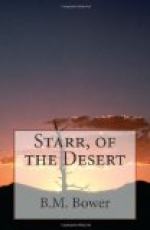Her eyes turned to Starr, whose name she did not know; who had twice come riding out of the distance to do her some slight service before he rode on into the distance that seemed so vast. Who was he? What petty round of duties and pleasures made up his daily, intimate life? She did not know. She did not feel the need of knowing.
Standing there with his thin face turned to the moon so that she saw, clean-cut against the night, his strong profile; with one arm thrown across the neck of his horse and his big hat tilted back so that she could see the heavy, brown hair that framed his fine forehead; with the look of a dreamer in his eyes and the wistfulness of the lonely on his lips, all at once he seemed to be a part of the desert and its mysteries.
She could picture him living alone somewhere in its wild fastness, aloof from the little things of life. He seemed to epitomize vividly the meaning of a song she had often sung unmeaningly:
“From the desert I come to thee,
On my Arab shod with fire;
And the winds are left behind
In the speed of my desire.”
While she looked—while the words of that old Bedouin Love Song thrummed through her memory, quite suddenly Starr began to sing, taking up the song where her memory had brought her:
“Till the sun grows cold,
And the stars are old,
And the leaves of the Judgment Book unfold!”
Softly he sang, as though he had forgotten that she was there. Softly, but with a resonant, vibrating quality that made the words alive and quivering with meaning.
Helen May caught her breath. How did he know she was thinking that song? How did he chance to take it up just at the point where her memory had carried it? Had he read her mind? She stared at him, her lips parted; wondering, a little awed, but listening and thrilling to the human sweetness of his tones. And when he had sung the last yearning note of primitive desire, Starr turned his head and looked into her eyes.
Helen May felt as though he had taken her in his arms and kissed her lingeringly. Yet he had not moved except to turn his face toward her. She could not look away, could not even try to pull her eyes from his. It was as though she yielded. She felt suffocated, though her breath came quickly, a little unevenly.
Starr looked away, across the desert where the moon lighted it whitely. It was as though he had released her. She felt flustered, disconcerted. She could not understand herself or him, or the primary forces that had moved them both. And why had he sung that Bedouin Love Song just as she was thinking it as something that explained him and identified him? It was mysterious as the desert itself lying there so quiet under the moon. It was weird as the cry of the coyote. It was uncanny as spirit rappings. But she could not feel any resentment; only a thrill that was part pleasure and part pain. She wondered if he had felt the same; if he knew. But she could not bring herself to face even the thought of asking him. It was like the night silence around them: speech would dwarf and cheapen and distort.




